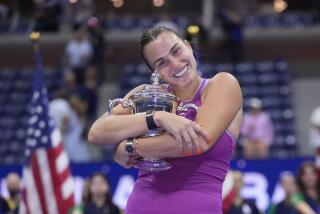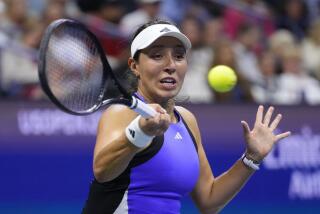Feeling-Out Process
- Share via
NEW YORK — Serena Williams says she feels like the U.S. Open defending champion. “Kind of,” Williams said, and after all, she didn’t play here a year ago, missing her favorite major tournament because of knee surgery. So Williams hasn’t lost at this place since defeating her sister Venus in the 2002 final.
Justine Henin-Hardenne should feel like the defending champion, because she is. But Henin-Hardenne doesn’t know how to feel. The Belgian, still ranked No. 1 in the world, has played only eight matches in nearly five months as she struggled to recover and regain her strength from a viral illness.
Andy Roddick arrived as a major player here a year ago when he won his first Grand Slam tournament title, a boost that briefly propelled him to a No. 1 ranking.
Roger Federer has won just about everything else, including a rousing defense of his first Wimbledon title in July. Federer cemented his place as the best player in the world by recovering from a first-set loss to Roddick in the Wimbledon final and emphatically dispatching Roddick in the fourth set of the match.
The U.S. Open begins Monday and there is no sense yet of where the favorites are or who they are. There is no feel for where the winner might come from.
On the women’s side, will it be someone such as Henin-Hardenne, who was delighted to have won an Olympic gold medal last week in her first tournament since returning from her illness?
Could it be Serena, who has bopped in and out of the tour scene this year, sometimes injured, sometimes seeming a little flaky, sometimes seeming more interested in other pursuits of acting and designing, only to return and be suitably devastated by a Wimbledon final loss to a 17-year-old?
The 17-year-old was Maria Sharapova, certainly the summer “It” girl. She is young, tall, blond, tanned, beautiful and in possession of a punishing forehand and steely nerve. She is still in the enveloping glow that came from winning Wimbledon last month with a monumental drubbing of Serena in the final.
But Sharapova has had trouble winning matches since Wimbledon. That doesn’t seem to bother the Russian, who said, “When you win such an amazing tournament like Wimbledon, that is not the end of your career. I still know that there are so many things I have to work on. So that’s just the way the game goes. Sometimes you lose.”
Serena, seeded No. 3, pulled out of the Olympics only hours before she was supposed to fly to Athens, complaining of an ache in the knee she hurt last year.
On Saturday she said the balky knee was “a lot better.” She said her choice to abandon the Olympics was “tough for me,” and that her game was “solid.” In other words, Williams didn’t say a lot. But she looked good in black denim -- short skirt, skin-tight vest with studs, bandana -- and mentioned a “black mesh dress that’s kind of see-through” that she might take out during the tournament.
Maybe the winner finally will be second-seeded Amelie Mauresmo, who played so well against Serena in a Wimbledon semifinal but couldn’t play well enough at the end.
Or the winner could be the traditional lurker.
Fifth-seeded Lindsay Davenport, as always, will wander in the background. Davenport will share her wisdom and always have a smart assessment of the conditions, her opponents and her place in the draw. She also owns a four-tournament win streak on the summer hard-court circuit that includes confidence-building wins over Serena and Venus Williams.
On the men’s side, tennis fans would be happy to see a reignition of the budding rivalry between Federer and Roddick.
Top-seeded Federer and defending champion Roddick have separated themselves from the rest of the men’s field by their play and showed at Wimbledon that their contrasting styles on court and in personality can provide fine and interesting tennis.
Federer, who hasn’t gone past the fourth round here in four tries, has a 58-6 record this year and the growing confidence to adjust to the heat, noise, traumas and tribulations that usually accompany the Open.
“I feel like I’ve played good here but not great,” Federer said. “Three times in the fourth round, it’s not bad. But now I think it’s time for me to step it up because I’ve played so well in the last few Grand Slams.”
Roddick, who, like Federer, went to the Olympics and lost early, says he takes extra confidence into this tournament because of his win here a year ago.
“I have that thing in the back of my head that I’ve done it before,” Roddick said. “Last year it was set up for catastrophe, with me playing well coming in. If something would have happened, then it would have been chaos.
“But I think I’m a little bit more relaxed this year. Deep down, I think I’m a little bit more confident.”
Roddick drew 18-year-old wild card Scoville Jenkins in the first round. Jenkins became the first African American to win the USTA boys’ 18 National Hard Court title in Kalamazoo, Mich., last week. The winner gets a spot at the Open.
“I’m sure he’s got to be excited,” Roddick said. “He’s probably been watching this tournament for a while now. If I was him, I would just try to make the most of it. Hopefully, that won’t be enough.”
A year ago no one had enough to beat Roddick.
This year? Too soon to tell.
*
U.S. Open
* Dates: Monday through Sept. 12.
* Site: USTA National Tennis Center in New York.
* Defending men’s champion: Andy Roddick.
* Defending women’s champion: Justine Henin-Hardenne, Belgium.
* Television: Monday to Sept. 3: 8 a.m.-2 p.m., 4-8 p.m., USA; Sept. 4-6: 8 a.m.-noon, Ch. 2; 4-8 p.m., USA; Sept. 7: 8 a.m.-3 p.m., 4-8 p.m., USA; Sept. 8: 8 a.m.-2 p.m., 4-8 p.m., USA; Sept. 9: 8 a.m.-1 p.m., 4-8 p.m., USA; Sept 10: 8 a.m.-3 p.m., Ch. 2; Sept. 11: 9 a.m.-3 p.m., 5-7 p.m., Ch. 2; Sept. 12: 10 a.m.-11:30 a.m., USA; 1-4 p.m., Ch. 2.
More to Read
Go beyond the scoreboard
Get the latest on L.A.'s teams in the daily Sports Report newsletter.
You may occasionally receive promotional content from the Los Angeles Times.










